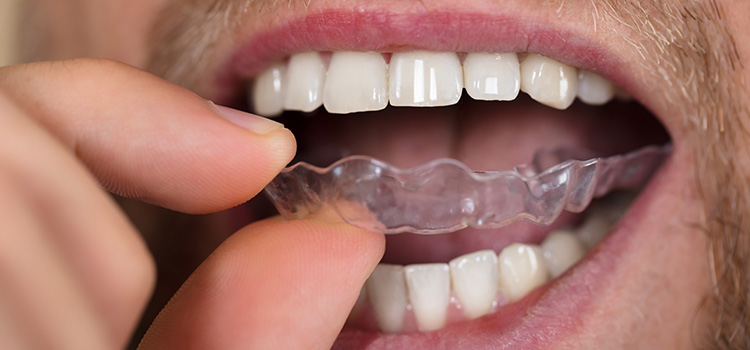Tinnitus And Bruxism
9th Aug 2020

Maybe you’ve had tinnitus, that chronic, familiar buzzing or ringing, for years. Or maybe it just started and you don’t know what to do. Either way, knowing the cause can be a great help. If you grind your teeth at night (which is known as bruxism), there could be a link between your tinnitus and bruxism.
Here, you’ll learn more about this connection. While this article can help you better understand your symptoms, talk to your doctor if you have concerns about your hearing.

The Relationship Between Bruxism and Tinnitus
Bruxism is a condition where people grind and clench their teeth, usually at night. If this describes you, grinding teeth at night can put extra pressure on your teeth, jaw, facial muscles, and — yes — even your ears.
Causes and Symptoms of Bruxism
Bruxism is thought to have many causes, including stress, certain medications, and some medical conditions like sleep apnea. If you have bruxism, you might notice symptoms beyond tinnitus such as jaw pain, headaches, TMJ, or facial pain.
How the Jaw Muscle Connects Your Teeth and Ears
It makes sense that bruxism could affect your ear because you have jaw muscles that extend close to your ear. Your jaw joint, or temporomandibular joint, sits in front of your ears.
To feel this connection, rest your hands in front of your ears with your jaw relaxed. Then, clench your jaw. You’ll feel your jaw joint move and the jaw muscles at the front of the ears tense and tighten.
Dawson Dental explains this phenomenon, saying, “When pressure is put on the [temporomandibular] joint, it radiates into the ears since they are in close proximity. The phantom sounds you hear from tinnitus are caused by your bone structure responding to the action of teeth grinding and clenching.”
In other words, pressure from your jaw joints can impact the ears and cause ringing and buzzing.
Hearing Loss and Bruxism
In addition to tinnitus, teeth grinding and clenching can connect to hearing loss. None of your body parts exist in isolation — everything is intricately connected. That’s why a disturbance in one body part can affect a seemingly unrelated body part. Because your jaw joint is so close to your ear, the pressure and vibrations that result from your grinding can disturb your middle ear enough to cause hearing loss.
The research on tinnitus and bruxism is limited, and bruxism hasn’t been proven to cause tinnitus. However, one study found a relationship between bruxism and tinnitus. In the study, people who had sleep bruxism and temporomandibular joint disorder (TMD) were more likely to have more severe tinnitus.

How to Tell If Your Tinnitus Is Caused by Bruxism
Your hearing loss and tinnitus may have other causes. If you’re curious though, you can review bruxism symptoms and see if your symptoms match.
Keep in mind, bruxism is not a proven cause of hearing issues. Additionally, this is no substitute for speaking with a physician, dentist, or ear, nose, and throat doctor.
Common symptoms of bruxism include:
- Headache
- Facial pain or soreness
- Jaw pain or soreness
- Cracked or chipped teeth
- Sores or cuts on your tongue and cheek
- Tooth pain or sensitivity
- Sleep disturbances (especially if you wake up your partner with the sound of tooth grinding)
- Worn enamel
- Ear pain or soreness
- Locked jaw
- TMJ disorders
If you notice any of these other symptoms, you could have teeth grinding issues alongside tinnitus, which could indicate the two conditions are related. Another way to tell if your tinnitus is caused by bruxism is the timing of your symptoms. Although symptoms can pop up any time, if your teeth grinding and tinnitus began around the same time, that could indicate the two are related.
How to Treat Bruxism
Regardless of whether teeth grinding is behind your tinnitus, it’s important to treat your bruxism symptoms. Read on to learn about some bruxism treatment options.
Medication and Medical Conditions
For bruxism that is thought to be caused by a medication or medical condition, you can work with your doctor to adjust the medication or treat the underlying condition.
For example, some antidepressants have been linked to bruxism, but one study found that some antidepressants, like Buspar, could relieve the symptoms of bruxism. Bruxism is also associated with conditions like sleep apnea and GERD, which your doctor can help you manage.
If you can eliminate that cause, you may be able to relieve both your bruxism and tinnitus.

Stress Management
Bruxism is thought to be caused by stress in many people, so stress reduction techniques might help these people reduce their grinding. Homeopathic remedies are one way to relax before bedtime. You can also talk with a therapist about stress management.
Night Guards
A popular treatment option for bruxism is a night guard. Since most people have sleep bruxism, these mouth guards are designed to be worn at night as a protective cushion between your top and bottom teeth.
Related Articles:
However, note that night guards don’t stop you from grinding your teeth. While you can expect symptoms to reduce, they may recur in a milder way.
It’s possible that since your night guard is a cushion between your top and bottom teeth, it eases the pressure and vibrations on your temporomandibular joint and then eases the stress on your ear.
You can buy your night guard from the dentist, over the counter, or directly from a dental lab. We further discuss different types of night guards and how to choose which guard to use here. Here’s a quick review of your mouth guard options:
- Over-the-counter night guards are the cheapest option, but they don’t provide a truly custom fit. A poor fit can irritate your gums and teeth further and reduce symptoms less effectively than a custom-fit guard.
- Custom-fit night guards from your dentist are professionally made to fit your teeth perfectly, but they tend to be expensive.
- Custom-fit night guards from a dental lab are the same as professionally made night guards you’d get from your dentist, but they’re typically cheaper than your dentist’s prices.
Regardless of which type you choose, that protective barrier between your teeth might improve tinnitus caused by bruxism.
Additional Treatments for Tinnitus
If treating your bruxism doesn’t do anything for your tinnitus, there could be a different cause, such as exposure to loud noise or earwax blockage. Talk to your doctor to try to determine the cause. If you can eliminate that, you might be able to get rid of your tinnitus. Unfortunately, there is no known cure for tinnitus itself. Some of the following treatments might help manage your tinnitus:
- Hearing aids
- White noise
- Diet change
- Stress reduction
- Medication
- Cognitive behavioral therapy
- Sound masking (the use of background noise to block the noise of tinnitus)
To learn more about managing and living with tinnitus, visit the American Tinnitus Association.
Conclusion
Living with tinnitus and bruxism can be frustrating and scary, but there are ways to treat both of these conditions. If bruxism is the cause of your tinnitus, treating your grinding may also take care of your tinnitus.
One of the most common ways to treat bruxism is with a night guard, but it’s not the only way. Talk with your dentist and your doctor to find the right treatments for both bruxism and tinnitus.
At Pro Teeth Guard, you can get a custom-fit mouthguard at an affordable price. We make our night guards in a professional dental lab, and we back every night guard’s comfortable fit with our 110% money-back guarantee.

- Most Popular
- Hard Outside, Soft Inside
- 2MM Thick
- Moderate / Heavy

- Most Durable
- Hard Materials
- 1.5MM Thick
- Heavy / Severe

- For Day Time Use
- Thin, Barely Visible
- 1MM Thick
- Light / Moderate

- For Clenching
- Flexible & Soft
- 1.5MM Thick
- Light / Moderate

